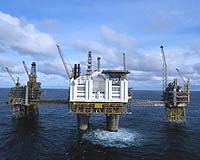 |
Boston MA (SPX) May 21, 2009 ConocoPhillips shareholders demonstrated even stronger support this year than last for a shareholder proposal calling for the company to fully account for the environmental impact of its tar sands operations. Over thirty percent (30.54%) of shareholders voted in support, compare to last year's vote of 27.5%. The "yes" vote represented approximately $12.8 billion in share value. Shareholders owning $7.2 billion in value abstained. The proposal, filed by Trillium Asset Management and Green Century Capital Management, both Boston-based socially responsible investment managers, called for an independent committee of the Board to prepare a report "on the environmental damage that would result from the company's expanding oil sands operations in the Canadian boreal forest." It also said the report should consider the implications of discontinuing these expansions. Oil sands play a huge role in ConocoPhillips' strategic plan. The company has the explicit goal of becoming the largest oil sands producer in Alberta, with a target of 1 million barrels per day over the next 20 years. The company's total worldwide production at year-end 2007 was 1.9 million barrels per day. Shelley Alpern, Director of Social Research and Advocacy at Trillium, said the vote should serve as a wake-up call not just for ConocoPhillips but for the rest of the industry as well. "The oil and gas industry has no trouble communicating the opportunity that the oil sands represent. But across the board, oil and gas companies are not leveling with shareholders about the risks and liabilities. The potential downside of oil sands extraction is much greater than that of conventional oil operations, because the environmental and social impacts of oil sands drilling are in many ways far more intense than for conventional oil." Some of those impacts include: + Water intensity. Extracting one barrel of bitumen requires 2 to 5 barrels of fresh water. + Energy intensity. The natural gas required to process one barrel of bitumen can heat the average Canadian's home for up to 5 and a half days. + Water pollution, impact on biodiversity. Syncrude's tailing ponds made international headlines last year when hundreds of waterfowl became fatally mired in them during their migration. + Carbon intensity. Producing one barrel of bitumen leads to nearly three times the carbon emissions of one barrel of conventional oil. In the last year, public awareness of the impact of the tar sands has increased greatly. Canadian and American environmental groups and directly affected Canadian First Nations have stepped up public campaigns, culminating in full page newspaper ads to coincide with President Barack Obama's visit to Canada in February. Concern has also grown about the economic viability of oil sands projects as worldwide oil prices have plunged in the last year, forcing many companies to suspend or cancel projects. The oil sands are also threatened by U.S. policy initiatives such as a national Low-Carbon Fuel Standard (LCFS), and Section 526 of the 2007 Energy Bill, which prohibits federal agencies from creating exclusive contracts for any transportation fuel whose lifecycle greenhouse gas emissions exceed those of conventional petroleum sources. Earlier this month, a shareholder proposal at the energy pipeline company Enbridge Inc. asked the company to disclose potential roadblocks related to First Nation approval of the Northern Gateway oil sands pipeline project. The resolution highlights that consent from Canadian aboriginal groups is a key risk that oil sands and energy companies, like Enbridge and ConocoPhillips, must address. Filed by Ethical Funds, a Canadian mutual fund company, the proposal received 32%. Trillium Asset Management was a co-sponsor of the proposal. "The environmental impacts of oil sands operations are enormous, and ConocoPhillips' shareholders will ultimately bear responsibility for the regulatory, reputational, litigious and competitive risks associated with these impacts. It is critical that ConocoPhillips achieves greater transparency on the environmental damage caused by its projects and any associated risks," said Emily Stone, Shareholder Advocate for Green Century Capital Management. "Oil sand extraction is fraught with risks, from regulations mandating low-carbon fuels to potential First Nation litigation, and investors need to know if companies are prepared for and proactively managing these risks," said Mindy S. Lubber, president of Ceres, a coalition of investors and environmental groups. "A strong vote, coming the second year in a row, deserves a thoughtful and timely response from ConocoPhillips." Share This Article With Planet Earth
Related Links ConocoPhillips Powering The World in the 21st Century at Energy-Daily.com
 Russia, Norway discuss Arctic energy development
Russia, Norway discuss Arctic energy developmentBarvikha, Russia (AFP) May 19, 2009 Russian President Dmitry Medvedev and Norwegian Prime Minister Jens Stoltenberg met Tuesday for talks on the Arctic, amid growing international interest in the region's vast energy resources. "Our countries are northern, Arctic. The region's development depends how we carry out a coordinated position on the development of the Arctic," Medvedev told Stoltenberg at his residence outside Moscow ... read more |
|
| The content herein, unless otherwise known to be public domain, are Copyright 1995-2009 - SpaceDaily. AFP and UPI Wire Stories are copyright Agence France-Presse and United Press International. ESA Portal Reports are copyright European Space Agency. All NASA sourced material is public domain. Additional copyrights may apply in whole or part to other bona fide parties. Advertising does not imply endorsement,agreement or approval of any opinions, statements or information provided by SpaceDaily on any Web page published or hosted by SpaceDaily. Privacy Statement |